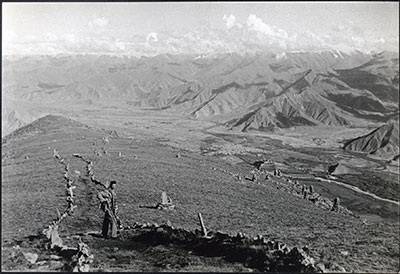
1998.131.263 (Print black & white)


1998.131.263 (Print black & white)

Frederick Spencer Chapman
Frederick Spencer Chapman
September 27th 1936
Hugh Richardson
Lhasa Area > Gyamberi
1998.131.263
115 x 167 mm
Print gelatin silver
Donated 1994
Faith Spencer Chapman
British Diplomatic Mission to Lhasa 1936-37
Frederick Spencer Chapman
CU.17 [view film roll]
SC.T.2.263
Notes on print/mount - 'C-U-17' has been written on the back of the print in pencil. A small white sticker has also been attached on the left hand side on the back of the print on which 'Z6' has been written in red/pink ink [MS 15/2/2005]
Manual Catalogues - Caption in Chapman's hand-written list of negatives made whilst on the Mission to Lhasa, 1936-7 [See PRM Manuscripts Collection]: 'Track down Holy HIll [Gyamberi] and Lhasa below (better than 10 [CU.10]'; PRM Manuscripts Collection: ‘List of Tibetan Prints and Negatives’ - Book 1, From Gangtok to the Natu La August 1936: ‘35/1 - Lines of stones marking the way up a holy hill which Lhasa officials must climb on a certain day in the year. Lhasa and the Potala can be seen in the distance’ [MS 16/03/2006]
Research publication - Clare Harris and Tsering Shakya (eds.) 'Seeing Lhasa: British Depictions of the Tibetan Capital 1936-1947' [Chicago: Serindia Publications, 2003, p. 28.
Other Information - Description: Chapman did not use this image to illustrate the entry in the official Mission Diary for September 27th 1936, but the journey he describes on this day provides the context in which this photograph was taken. The text in the Diary for the journey is as follows:"As far as possible, Sunday is kept as a holiday. Morgan, Chapman, Nepean and Richardson climbed of [ sic ] 17,450ft overlooking Drepung Monastery. It is a very holy place called Gyenbay Ri. A kind of 'via sacra' marked out with stones leads along a steep ridge to the summit which is covered with cairns and prayer flags. We were told that the Dalai Lama and every monk must climb the hill on certain occasions. Those who are too old for much effort go up on yaks. Only the yaks belonging to the Dalai Lama are allowed to graze on so sacred a mountain". Chapman also described the visit to this mountain top in his populist publication Lhasa the Holy City [London: Chatto & Windus, 1938]. In this account he gives additional information about the flora of the region, in which he was greatly interested. He stated: "Only the Dalai's yaks may graze on this mountain, and only his doctors may collect herbs here. It was certainly an excellent place for plants. I found a small patch of a rare blue gentian with hairy leaves ( Gentiana amphicratea ), also several unusual aconites, a rare swertia, and other plants which I found in no other locality near Lhasa. A remarkable Via Sacra , bordered by lines of stones and cairns, led along the last mile of the grassy ridge to the summit, which was covered with literally hundreds of cairns, many of them eight or ten feet high. From here we could see far down the valley of the Kyi Chu, and it was noticeable that this valley is quite level right up to the very foot of the spurs which rise, one after another, so precipitously from its sides. Several snowy peaks were visible in the extreme distance, but we could not identify them" [ibid., pp.259-60] [MS 26/3/2005]
Other Information - Related Images: Images prefixed with 'CU' comprise a group of negatives containing images of gentians, lammergeyers, and vultures, Hugh Richardson and cairns, Gyamberi [‘Holy Hill’], Norbhu, Trimon, Tsarong, Ringang, Gould, Tendong, chang girls. They all seem to have been taken on September 27th - 28th 1936 [MS 16/03/2006]
Other Information - Cultural Background: people go to the top of the peak at occasions such as New Year and burn dried juniper offerings to purify the environment and on the 4th day of the 6th Tibetan month there is a festival at which all the young people and camp for the night on the mountain: becomes a forum for a festival. This gathering is often used as marker in Tibetan folk songs connected with lovers' trysts etc. [TS 31/1/2005]
For Citation use:
The Tibet Album.
"Hugh Richardson on Mount Gyamberi"
05 Dec. 2006. The Pitt Rivers Museum.
<http://tibet.prm.ox.ac.uk/photo_1998.131.263.html>.
For more information about photographic usage or to order prints, please visit the The Pitt Rivers Museum.
© The Pitt Rivers Museum